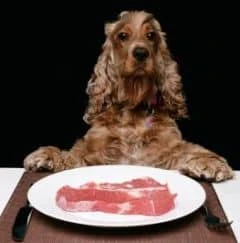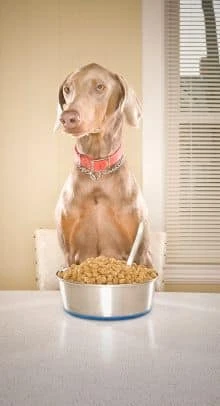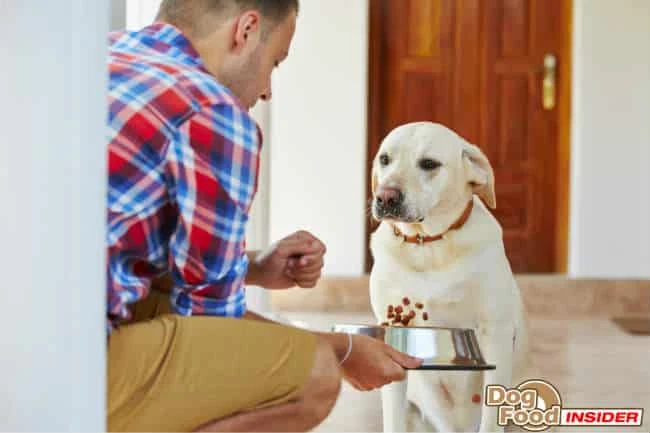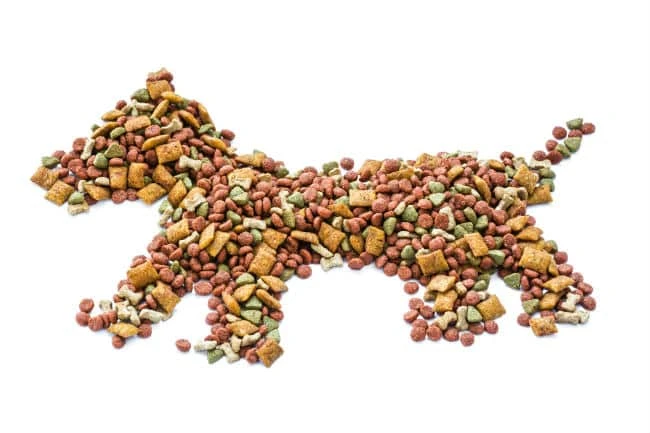Homemade Dog Food – Discover the pros and cons of home made dog food

Homemade Dog Food
If you choose to feed your pooch a homemade dog food recipe rather than a dry food or one of the tins off the supermarket shelf you need to make sure that he is getting all of the nutrients that can sustain him throughout the day. Some owners make the mistake by getting confused with ‘ingredients’ as opposed to ‘nutrients’.
The ingredients include the chicken, beef, fish etc that make up the consistency and flavor and the nutrients are one of the six basic nutrients needed to keep your dog healthy i.e. proteins, carbohydrates, fats, minerals, vitamins and water. It is therefore essential if you are making your own recipe that you include enough nutrients to keep your dog healthy and happy. Of course if you don’t get the flavour right then your dog will lift his nose in the air and the bowl will remain full (so you need to get the right balance).
 If you are keen to make your own homemade dog food then you will need to work out your dog’s individual needs – for example a human athlete needs the right balance of carbohyhdrates and proteins so they are able to compete at their optimum performance (and it’s no differenct for your dog)! So if your dog is old, energetic, obese, pregnant or still a puppy then you will need to adjust his diet appropriatly. Below is quick guide that can determine a dog’s diet and the ‘individual needs’ that may need to be taken into account when making your own dog food.
If you are keen to make your own homemade dog food then you will need to work out your dog’s individual needs – for example a human athlete needs the right balance of carbohyhdrates and proteins so they are able to compete at their optimum performance (and it’s no differenct for your dog)! So if your dog is old, energetic, obese, pregnant or still a puppy then you will need to adjust his diet appropriatly. Below is quick guide that can determine a dog’s diet and the ‘individual needs’ that may need to be taken into account when making your own dog food.
– The environment can play a large role on what you feed your dog. If your dog is cold or has a poor living environment then you will need to make sure that your homemade recipe has all of the correct nutrients.
– Is your dog active or a working dog? If he is then you will need to make sure that his diet has enough nutrients and calories to sustain him.
– How old is your dog? As your dog gets older his diet will need to change.
– What are your dog’s metabolic and chemical efficiency? (Ask your vet if you are unsure). A pregnant bitch or a dog that is lactating will need to have sufficient nutrients.

If you do choose to make your own dog food then you need to make sure that the food contains a healthy balance and combination of the six basic nutrients listed below.
Carbohydrates are a ready source of energy and are often found in fairly large quantities in commercially prepared dog foods. Carbohydrates are normally introduced into comercial dog foods through vegetable matter, cereals, grains and fibre. Dogs do not always digest fiber effectively which can lead to the digestive tract not being able to absorb important nutrients.
Protein – It is actually a federal requirement that all manufactured dog food has a a complete list of all of the ingredients in that specific food. Most of the protein contained within dog food will come from corn, wheat, cereal, grain, fish, meat and poultry. Of course this does not mean that the protein is of a high quality. Sometimes the amount of protein that is found in commercially manufactured dog food is quite low (in can be as low as 3%) which is a tiny proportion.
Interestingly if the manufactured food has the term ‘chicken’, ‘fish’ or ‘beef’ on the label then 95% of the dry weight of that food must come from that specific protein source. However, this can be side stepped by some clever manufacturers by using the term ‘beef chunks’ or ‘turkey chunks’ etc. Protein also helps to supply your dog with amino acids.
If you are making your own homemade dog food then it is vital that you add ten of the twenty two amino acids to your dog food recipe (this is because these ten are not manufactured by dogs so are classed as essential. The ten essential amino acids are histidine, valine, tryptophan, lysine, methionine, leucine, isoleucine, arginine, phenylalanine and threonine. If your dog is not getting enough of the essential amino acids he may have a reduced appetite, impaired growth and other symptoms.
Minerals are essential in keeping your dog healthy. There are two groups of minerals that dogs need as part of their diet. The first group consists of iodine, copper, iron, zinc, cobalt, manganese, molybdenum, fluorine and chromium with these minerals only needed in small amounts. However, the ‘macro’ minerals such as sodium, magnesium, calcium, potassium and phosphorus are needed by dogs in large amounts. If you are making your own homemade dog food you should never add any supplements without always speak with your vet first.
Vitamins – Most of the vitamins needed by a dog are not produced inside the dog’s body (apart from vitamin C, niacin, choline and retinol. Vitamins are split into two groups – fat soluble and water soluble vitamins. Water soluble vitamins must be replaced on a daily basis especially the B vitamins.
The fat soluble vitamins including A,D, E and K are stored in the dog’s body so a continuous supply of these vitamins is not essential – in fact giving a dog to many of these vitamins can be toxic to dogs. Of course in manufactured dog food many of the vitamins are destroyed in the cooking and manufacturing process however these vitamins are normally taken into consideration and they are added later. If you are making a homemade dog food recipe you should not add any vitamins unless you have spoken with your vet.
Fats – It is the fats and oils that are found in manufactured and ideally homemade dog food recipes that help to keep the coat and skin healthy. The fats also help with the absorption of important fat soluble vitamins such as A, D, E and K. Although the absolute minimum amount of fat that should be present in a homemade dog food or commercialy manufactured food is around 5% many breeders and owners who have dogs that lead a particularly active lifestyle will increase the amount of fat in their homemade dog food recipe to as much as 15-35%.
Of course if you do choose to make your own homemade dog food then you need to remember that fats are high in calories and have twice as many calories compared to carbohydrates and protein (so take this into account as you don’t want your dog to become obese). Adding too much fat to your homemade dog food recipe can also lead to problems with the digestive system (leading to diarrhea).
Water is of course a vital part of any dog’s diet as it helps to carry nutrients around the body, flush away waste materials and helps to maintain the dog’s body fluids.





